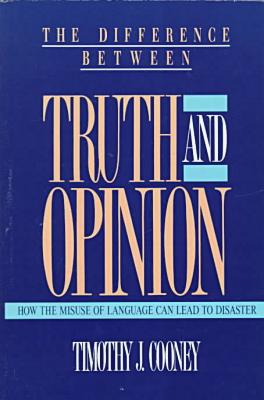
The Difference between Truth And Opinion
BY TIMOTHY J. COONEY (PUBLISHED 1991 BY PROMETHEUS BOOKS. 127 pages
This book is a rarity. It is extremely hard to find a book on critical thinking that is not obsequious towards religion. The central theme of The Difference Between Truth and Opinion is the damage that the misuse of language can cause, particularly when opinion is passed off as truth. This fundamental misuse occurs in countless areas of our daily lives and, though we may not often recognize it, this can have devastating ramifications.
The first half of the book, called Truth, opinion, and the phony declarative,” does not at first appear to be especially profound, either in its approach to the subject matter or in its content. Here, it seems to suffer from a trait all too common to may books on critical thinking: an inability to string ideas together sequentially. This section tends to be ponderous, with platitudes posing as essential text.
However, just when you are tempted to toss aside the book as inconsequential, Cooney says, “I shall try to show in part 2 that neither you or I, nor any prophet, priest, or person who ever lived could recognize god from the devil…unless we first knew good from evil, right from wrong.” At this point, we perk up our ears: Cooney tells us that the inculcation of phony “truths” which are in reality only opinion, can prove to be extremely dangerous. For if a youngster is raised to think that his religion is the only true one, it follows that anyone to thinks differently must be wrong. And right there is the prescription for future disaster.
The section on morality is outstanding. Cooney asserts that moral behavior must come from within ourselves, rather than as a gift from a supernatural being. He uses the following to illustrate his point: “If I received a commandment, or series of commandments, from this being, the first choice I have is whether or not to obey “him.” If the “commander” is malevolent and tells me to kill all my neighbors, I would probably conclude this being is evil. Conversely, if he says to love my neighbors, then I would conclude he is benevolent. The point is that there is no way of knowing which he is unless I previously know right from wrong. If it is argued that “God” in fact gave us the ability to distinguish between the two, then he takes himself out of the picture. Why? Simply because people constantly argue over just what morality is. Why would god put so many conflicting ideas about morality into people’s heads?”
This timely commentary enables us to better understand the social climate of biblical times. The prophets of old, simply put, were the outcasts, the deranged, the social pariahs and misfits of their day. Consequently, all “divine” revelation must be greeted with extreme suspicion by rational people. Truth and Opinion thus exposes revelation to be nothing more than occultism.
More than just a book on critical thinking, The Difference Between Truth and Opinion provides freethinkers with a solid philosophical and psychological foundation from which we can authoritatively debate the issues of morality, biblical truth and god’s existence.
Categories: Book Reviews
